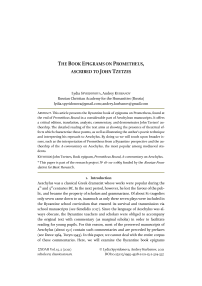The Book epigrams on Prometheus, ascribed to John Tzetzes
Автор: Lydia Spyridonova, Andrey Kurbanov
Журнал: Schole. Философское антиковедение и классическая традиция @classics-nsu-schole
Статья в выпуске: 2 т.15, 2021 года.
Бесплатный доступ
This article presents the Byzantine book of epigrams on Prometheus, found at the end of Prometheus Bound in a considerable part of Aeschylean manuscripts. It offers a critical edition, translation, analysis, commentary, and demonstrates John Tzetzes’ authorship. The detailed reading of the text aims at showing the presence of theatrical effects which characterise these poems, as well as illustrating the author’s poetic technique and interpreting his reproach to Aeschylus. By doing so we will touch upon broader issues, such as the interpretation of Prometheus from a Byzantine perspective and the authorship of the A-commentary on Aeschylus, the most popular among mediaeval students.
John Tzetzes, Book epigram, Prometheus Bound, A-commentary on Aeschylus.
Короткий адрес: https://sciup.org/147234436
IDR: 147234436 | DOI: 10.25205/1995-4328-2021-15-2-524-537
Список литературы The Book epigrams on Prometheus, ascribed to John Tzetzes
- Allegrini, S. (1971–1972) “Note di Giovanni Tzetzes ad Eschilo,” Annali della Facoltà di Lettere e Filosofia dell’Università di Perugia 9, 219-233.
- Andres, G. de. (1968) Catálogo de los Códices Griegos Desaparecidos de la Real Biblioteca de El Escorial. El Escorial.
- Bentein, K., Demoen, K. (2012) “The reader in eleventh-century book epigrams,” K. Demoen & F. Bernard, eds. Poetry and its contexts in eleventh-century Byzantium. Ashgate, 69–88.
- Budelmann, F. (2002) “Classical Commentary in Byzantium: John Tzetzes on Ancient Greek Literature,” R. Gibson et al., eds. The classical commentary: histories, practices, theory. Leiden: Brill, 141–69.
- Cole, T. (1967) Democritus and the Sources of Greek Anthropology. Cleveland, Ohio: the Press of Western Reserve University for the American Philological Association.
- Cougny, E. (1890) Epigrammatum anthologia palatine cum Planudeis et appendice nova epigrammatum veterum ex libris et marmoribus ductorum. Paris. Vol. 3.
- Dawe, R.D. (1964) The Collation and Investigation of the Manuscripts. Cambridge: University Press.
- Demoen, K. (2013) “La poésie de la συλλογή. Les paratextes métriques des manuscrits byzantins et le (vocabulaire du) recueil,” Ch. Gastgeber et al., eds. Pour l’amour de Byzance. Hommage à Paolo Odorico. Frankfurt am Main: Peter Lang, 89–98.
- Ercoles, M. (2014) “Aeschylus’ scholia and the hypomnematic tradition: an investigation,” Trends in Classics 6.1, 90–114.
- Gaisford, T. (1823) Poetae minores Graeci. Leipzig: Kühn. Vol. 2.
- Herington, C.J. (1972) The Older Scholia on the Prometheus Bound. Leiden.
- Hunger, H. (1954) “Allegorische Mythendeutung in der Antike und bei Johannes Tzetzes,” Jahrbuch der österreichischen byzantinischen Gesellschaft 3, 35–54.
- Lauxtermann, M.D. (2003) Byzantine Poetry from Pisides to Geometres: Texts and Contexts. Vienna: Verlag der Österreichischen Akademie der Wissenschaften.
- Panagiotis, A. (2017) “John Tzetzes and the blemish examiners: a Byzantine teacher on schedography, everyday language and writerly disposition,” Medioevo Greco 17, 1–57.
- Pietropaolo, D. (2010) “Whipping Jesus devoutly: the dramaturgy of catharsis and the Christian idea of tragic form,” I. Gildenhard, M. Revermann, eds. Beyond the Fifth Century: Interactions with Greek Tragedy from the Fourth Century BCE to the Middle Ages. Berlin; New York: De Gruyter.
- Roilos, P. (2006) Amphoteroglossia: A Poetics of the Twelfth-Century Medieval Greek Novel. Washington, DC.
- Simelidis, C. (2017) “Aeschylus in Byzantium,” R. Kennedy, ed. Brill's Companion to the Reception of Aeschylus. Leiden; Boston: Brill, 179–202.
- Smith, Ole L. (1996) “Medieval and Renaissance Commentaries in Greek on Classical Texts,” Classica & Mediaevalia 47, 391–405.
- Smith, Ole L. (1980) “The A Commentary on Aeschylus: Author and Date,” Greek, Roman and Byzantine Studies 21, 395–398.
- Šulek, M.J.J. (2011) Gifts of fire: an historical analysis of the Promethean myth for the light it casts on the philosophical philanthropy of Protagoras, Socrates and Plato. Ph.D. Indiana University.
- Tomadaki, M. and Opstall, van E. (2019), “The Tragedians from a Byzantine Perspective: Book Epigrams on Aeschylus, Sophocles and Euripides,” Medioevo greco 19, 65–92.
- Turyn, A. (1943) The Manuscript Tradition of the Tragedies of Aeschylus. New York: Polish Institute of Arts and Sciences in America.
- Wickham, L.R., ed. (1983) Cyril of Alexandria, Select Letters. Oxford Early Christian Texts. Oxford: Clarendon Press.


